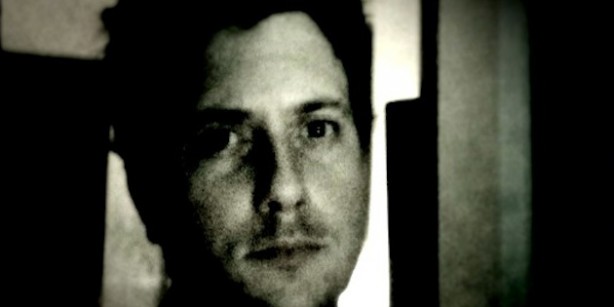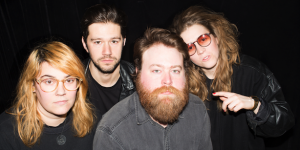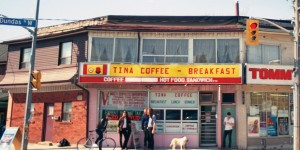 Music
Music
Q & A: Bry Webb on his post-Constantines music break, working with Feist, and the importance of Guelph
by Nicole Villeneuve
December 7, 2011
When Guelph, ON’s most beloved art punks, the Constantines, announced their split last August, it might have taken the wind out of us a bit, but it seemed only a matter of time before new projects would emerge. Guitarist Steve Lambke was already sitting on a new album from his side project Baby Eagle, and Bry Webb had been working on his folkier group the Harbour Coats on and off between Cons tours.
But the Harbour Coats didn’t work out, and Webb, needing a break, was mostly silent, until an invitation from Feist to contribute to her new album earlier this year. The newly married and fathered Webb, now living back in Guelph after a stint in Montreal, was spurred to start playing again, and some of what never made it past live shows as the Harbour Coats, as well as new, family inspired songs, ended up on new album Provider.
“I felt like I was maybe more present in the songs than I had been in a long time, so I just decided to release it under my own name,” Webb told us in Toronto the day he was to play Massey Hall on the third show as opener on the Feist tour. Provider is sparse, rich, and stark; a fitting and deliberate evolution for the singer/songwriter. We chatted with Webb about it, as well as his lengthy musical break, being inspired by Feist, and how Guelph is one of the most important things in his life.
AUX: How have the shows been?
Bry Webb: They’ve been amazing. Terrifying, a little bit, to play such quiet music in these huge spaces. The Constantines was a band that was super loud and energetic and ecstatic most of the time on stage. That gave us confidence; gave us that push to occupy space in a way that wasn’t as nerve wracking. This has been a little more frightening. But it’s come off well I think. Rich [Burnett, lap steel] and I were talking about trying to really get comfortable with the idea of space in the songs, and just embracing it. Sitting on a chord for four beats, you know, and listening to it reverberate in the room. When you start to embrace it it’s a pretty nice experience. But terrifying, for sure, at first.
I remember reading with the Harbour Coats that you were a little reluctant to do a solo thing. So while I was expecting to see something post-Constantines, I was surprised to see this with your name on it.
I resisted putting my name on a record for a long time. The Harbour Ccoats was an amazing band, but it existed in between Constantines tours. We only played like six shows or something, and tried to record between these other tours I was on, so things just, recording wise, ended up feeling really disjointed and it didn’t work out. When I stopped that and moved from Montreal back to Guelph, I stopped focusing on music for a year. My wife and I were expecting a baby and we wanted to focus on that. I got a job at the community radio station [CFRU 93.3] as the Program Coordinator, and that’s been amazing. So I just didn’t think about making music for a while.
Then Leslie Feist asked me to sing on her record, and that was just the first push back into making music that I’d felt in a while. Around that time, I met Rich, and Mike Brooks, who plays pedal steel, and Tyler Belluz who plays upright bass, at shows around Guelph, where there’s a great kind of house show scene. We started talking about playing together. We have a cover band called the Mutations, so that was the first playing we did together. I was offered a show at the Donkey Sanctuary outside of Guelph, and that was our first show in this kind of arrangement. At that point I knew I couldn’t really put together a full rock band. It didn’t make practical sense, with my infant son sleeping upstairs either, so the four of us eventually got together and started rehearsing, and it was just very simple, not over thinking parts, not even really coming up with strict riffs or parts, but just playing along with the songs that I had written. It was very naked and I felt like I was maybe more present in the songs than I had been in a long time, so I just decided to release it under my own name. Plus I couldn’t come up with another band name at the time (laughs).
What particularly about the studio experience with Leslie was it that pushed you back into music?
It was enough of a complete surprise that it kind of shocked me back into it a little bit. And it was flattering that she was interested in having me involved. The other thing was, I mean, I have a love-hate relationship with recording. I really like the process of putting sounds together, but I don’t like finishing recordings, which was the problem with the Harbour Coats. But she asked me to do “The Bad In Each Other,” so I went to Montreal with my family, saw some friends, it was very easy going and not stressful at all, which was really important. It was recorded in this place called Studio Victor, which from the outside looks like a squat, and on the inside, it’s this beautifully preserved wooden room in the old RCA Victor Factory. It’s stunning. So we went in, and I was terrified that I was going to screw up or it just wasn’t going to work, then it’d be this awkward thing between Leslie and I. But I came in and she was super inviting and we were just joking around for a while before I went in to do anything. Then I went in and we just tried a bunch of stuff really casually, it was totally painless, and she was really enthusiastic about everything, so that was really encouraging. It was just easy. And I didn’t feel like I had to be responsible for the product after it my little bit was done, which was really liberating too. That process was just so comfortable. And that made me think that I might want to record again. It reminded me what I liked about recording.
And the recording for Provider sounds like it was pretty simple and casual. Was that important?
That was the only way it could have happened I think after my experience with the Harbour Coats. Jeff McMurrich is one half of Idée Fixe and runs 6 Nassau Recording in Kensington Market. He’s amazing at recording things live. He asked if I wanted to come up and just try recording, no pressure, he wasn’t going to charge me for it or anything, just as an experiment to see what would happen. So we went up and tried a weekend, and it really started to sound pretty good. And we did one other weekend of tracking and that was the record. But the fact that Jeff was suggesting doing something simple and not production heavy was operative. I don’t know if I would have been able to agree to anything other than that at that point.
Were most of the songs that ended up on the album ones that you’d had around for a while? Or did they come quickly once you got back into playing?
The song “Undertaker” is probably nine years old now. I’ve been writing songs that didn’t work as Constantines songs as long as the Cons were a band. “Rivers of Gold” is about six years old. It was written right after the Cons played Dawson City Music festival for the first time.
I wanted to ask about that song.
Yeah, it was just a magical time. That song is about capturing that moment, and making a little keepsake about that time. I wrote “Asa,” which is my son’s name, I wrote that song for him, and that was the first new song I had written in about a year and a half. Shortly after he was born, I started thinking about writing music for him, and not thinking about it outside of that at all. So I wrote that one almost as a little lullaby to him that incorporated all the meanings of his name. It was really liberating to think of it in those terms. It means a lot that people will check out this record because they love the Constantines, but that was pretty intimidating as well. Re-framing how I wrote music and thought about being creative was helpful. I was thinking about that too much. And then “Ex-Punks” was the most recent one. And that was sort of just about thinking about music and making music for 20 years. I grew up in punk rock, and just wanted to write a song about that.
You’re not an ex-punk yet though. It’s not a lament.
No, it’s not a lament at all, it’s just about punk rock and all the sentiments attached to my experience in it. I love punk rock in all its forms, or at least most of its forms. I don’t believe that punk is dead.
Songs like that, and you moving back to Guelph, and working with Leslie Feist, who you knew through the Three Gut crew, really sort of brings you full circle to getting started in the Guelph scene. Is Guelph important to you, in relation to your music?
Yeah, for sure. I grew up in London, ON, which had a really amazing scene in the early-mid 90s for independent music. It was a great scene to grow up in; great punk rock and all-ages shows, and a great all ages venue, which doesn’t happen much anymore. As I got out of university, I wanted to find a stronger community to connect to creatively. I was introduced to music by Jim Guthrie and Aaron Riches [of Royal City], and a bunch of other crazy amazing, music people from Guelph. It was even smaller than London but producing this really creatively yital work. I connected with Dallas [Wehrle, bass] and Steve [Lambke, guitar], who were at school in Guelph, and we started the Constantines. There were a few people doing really great house shows at that time, too. That’s how we kind of met the Three Gut people. Lisa Moran and Tyler Clarke Burke were wanting to do a house show for Royal City. I moved to Toronto reluctantly, because I loved what was happening in Guelph, but everyone that I was involved with creatively moved to Toronto, and I was kind of intrigued by the big city. But I always felt like I wanted to get back. Especially if I was in a family state of mind. When we were, my wife was intrigued, so we decided to do it.
And you’re involved in community radio there now.
Yeah, it’s been amazing. It’s the best job I could imagine getting, coming out of a career making music professionally. Although filling out that resume was terrifying. It worked out, and I feel I’m connected again. Coming back to Guelph after eight years, there’s still amazing bands that are doing things there, happy to make these crazy amazing things. Like Richard Laviolette and the Oil Spills. That record’s one of the best records I’ve heard in a long time. And he’s very politically motivated, and a community activist and connected to Guelph totally. There are a bunch of people that I used to know and a bunch of new people who are doing amazing things. I still feel totally connected to Guelph. It’s been a really important force in my life, that community.
Tags: Music, Interviews, News, Bry Webb, Constantines





